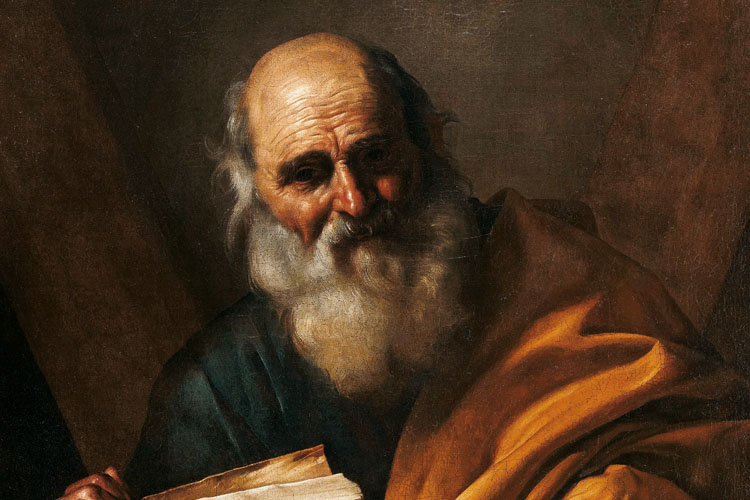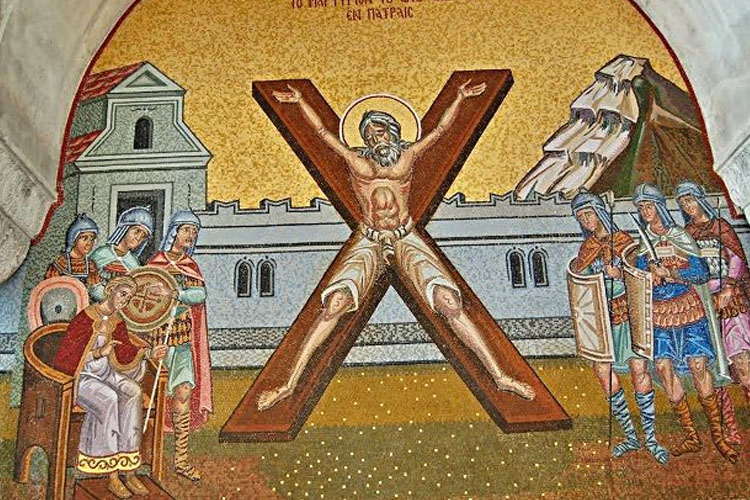Feast Day: 30 November
From humble beginnings
According to the New Testament gospel books, St Andrew was the brother of another famous apostle, St Peter (Matt 4:18–22, Mark 1:16–20). They were fishermen and therefore would have been at the lower end of the social classes. Originally a follower of John the Baptist (John 1:35–42), St Andrew was intrigued by John’s testimony of Jesus and began following his teachings. St Andrew later introduced St Peter to Jesus and after both following him in a low key manner for some time, they were called to become his direct disciples during the story told in Matthew and Mark. At this time St Andrew would likely have only been in his late teenage years!
A passionate disciple
Following his calling to become a ‘fisher of men’ (Matt 4:19), St Andrew entered Jesus’ closest companions. As he is not the focus of the gospel narrative, what we know of him at this time has to be draw out of the occasional mention of him.
From his participation at many important gospel events like the feeding of the five thousand (John 6:8) and the last supper (Matt. 26:17-30, Mark. 14:12-26, Luke. 22:7-39 and John. 13:1-17:26) we can tell he was a committed disciple who deeply trusted Jesus.
In John 12:20-19:24, we see another of the disciples, St Philip, going through St Andrew to arrange a meeting with Jesus for some Greeks who were seeking him. This in turn shows that St Andrew held a role of importance amongst the apostles and would have been personally close to Jesus.
Finally, Mark 13:1-31 shows that St Andrew was keen to delve deeper into the teachings Jesus gave them. In this passage we see how he and three other disciples approached Jesus on the Mont of Olives to ask further about the end times and His second coming. This shows he didn’t simply passively learn from Jesus but pondered in his heart what he was taught and went back for further confirmation.
Missionary and Church father
After the resurrection and the birth of the Church at Pentecost, St Andrew became a devoted missionary for Christ and by tradition established one of the five great sees of the Church.
While many of his brother apostles went east or west, St Andrew is said to have gone north. The Chronicle of Nestor explains how he went and preached around the Black Sea and even as far as modern day Kiev. The early church historian Eusebius adds weight to this claim as he records how St Andrew went and preached up in Scythia, a large area that comprised much of modern day Russia, Ukraine and Romania.
Probably his greatest legacy however was his founding of the see of Byzantium or, as we know it now, the see of Constantinople. During his preaching around the Black Sea, Hippolytus of Rome, Basil of Seleucia and the early church writings known as the Acts of Andrew all records the preaching and success he had in the region of Thrace. By tradition it is believed that St Andrew established the church there and appointed St Stachys the Apostle to take his place as leader of that local church. This would later develop into the Patriarchate of Constantinople, a seat equal to that of Antioch, Alexandria or Jerusalem and only being slightly under the authority of Rome, where the Pope is the first amongst these equals.
Martyrdom for Christ
Like all but one of the disciple, St Andrew was martyred for the faith he professed. While preaching in Greece, he was arrested and put to death by crucifixion. Believing he was unworthy to die like Christ however, St Andrew is believed to have requested he be crucified on a variation of the cross. To this day this variation is well known and countries have placed the cross upon their flags as a sign of respect and veneration.
Patronage
St Andrew is well loved for his strong devotion and missionary zeal. According to Wikipedia he is the patron saint for the following: Scotland, Barbados, Georgia, Ukraine, Russia, Sicily, Greece, Cyprus, Romania, Patras, San Andrés (Tenerife), Diocese of Parañaque, Telhado (pt), Amalfi, Luqa (Malta) and Prussia; Diocese of Victoria; fishermen, fishmongers and rope-makers, textile workers, singers, miners, pregnant women, butchers, farm workers, protection against sore throats, protection against convulsions, protection against fever, protection against whooping cough
Why Saint Andrew is important
A reflection from someone in our young Catholic community
For me, St Andrew is an incredible example of humility and devotion to God. On several occasions throughout his life he had the option of taking the easier road and yet consistently chose to take the harder road for him which he believed would bear more fruit for God.
Being the first of the apostles to follow Jesus he could have capitalized on his position to make himself the highest regarded of the apostles. Instead, his immediate concern is for introducing his brother to Jesus so that he too could learn the good news.
Later in life, when founding the church in Byzantium, St Andrew could have sat back and enjoyed his success. He could have taken the role of Bishop and nurtured the community which had now accepted him. Instead, St Andrew gave this role to another. He knew that even though he could do great things in Byzantium, he was no longer necessary for the churches development there. His decision to leave and minister elsewhere is truly one of great courage and devotion to God.
Prayer to Saint Andrew
O glorious St. Andrew, you were the first to recognize and follow the Lamb of God. With your friend, St. John, you remained with Jesus for that first day, for your entire life, and now throughout eternity. As you led your brother, St. Peter, to Christ and many others after him, draw us also to Him. Teach us to lead others to Christ solely out of love for Him and dedication in His service. Help us to learn the lesson of the Cross and to carry our daily crosses without complaint so that they may carry us to Jesus. Amen.



